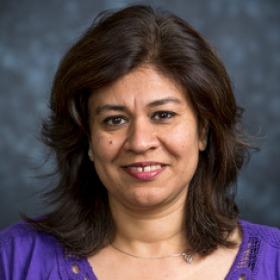The Indian Partition and the Practices of Memory (Enrichment Lecture:17)

The Indian Partition and the Practices of Memory
The Department of English organized the seventeenth in the series of online Enrichment Lectures on May 13, 2021 with Prof. Shuchi Kapila from Grinnel College, Iowa (USA),on “The Indian Partition and the Practices of Memory”.
Prof. Kapila began her talk by introducing the students to the broad, interdisciplinary field of Memory Studies. She cited a couple of theorists who have extensively researched memory and its ambivalence in terms of Partition narratives. She went on to distinguish individual memory from collective memory which concerns itself with shared versions of both the quotidian and ritualistic aspects of the past in a socio-cultural milieu, while also underlining the need to study the two kinds of memories together in order to gain a comprehensive understanding of the past.
In the times that we live in, memory as we know it, is diasporic, transcultural and transnational, wherein we approach it comparatively and generationally. It is performed, witnessed and processed. The reason the past makes sense in the present is because we can relate to the emotional quotient of the horrors of an event such as Partition. Moreover, memory has more to do with the pre-Partiton life narrative and about post-Partition survival than with material objects making it relatable to the people in the present. Partition, in fact, has been transmuted into a subterranean screen; a ghostly subtext which is present in various cultural and artistic forms, and tends to appear in displaced metaphorical forms in novels, poetry and cinema.
Prof. Kapila also expressed her interest in the oral histories of Partition which have only recently received the kind of importance the field deserves. It has facilitated a shift in focus to the lives of the historically underprivileged groups revealing that which was - until recently - unspeakable in public-communal discourse. This also made Partition an ongoing process that impinges on citizenship and belongingness even today.
Finally, Prof. Kapila discussed briefly 'Testimony in/ and Literature', especially in terms of how testimonies are a corrective to history, allowing for the expression of those aspects that historians could not take into account for various reasons. They would also show ow the questions of justice are contentious and impossible to settle. At the same time, most oral history projects are concerned with a very homogeneous class composition thereby giving rise to the need to include more voices. There has also been seen a tendency to repress Partition memories and to refuse to pass on its information to the next generation thus giving rise to a dialectic of remembering/ forgetting and ignorance in families.
The session came to an end with an extensive Q&A which explored many other aspects of Partition such as the guilt of Holocaust survival; how everyday life has absorbed the trauma of Partition; the impact of Partition memory on the current socio-political scenario; and, the impact on popular culture.

